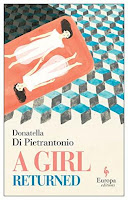Book Review: A Girl Returned by Donatella Di Pietrantonio (translated by Ann Goldstein)
On an August afternoon in 1975, a thirteen-year-old girl (our narrator) drags a suitcase up the stairs to an apartment belonging to her biological parents. She is 'returned' to her family by her adoptive parents, the only family she has ever known and whom she believed to be her true parents. This family, this apartment just a bus ride away from her seaside home and her new siblings are all alien to her. This family is related to her adoptive father and she was adopted by Signora Adalgisa when she was an infant of six months – an arrangement mutually agreed upon by both sets of parents. The circumstances surrounding her 'return' remain a mystery to her. She worries for the health of her adoptive mother. Is she sick? Is she even alive? Will she ever return to the safe, happy cocoon that was once her home?
She is thrust into a life completely different from the one she was accustomed to -an only child, living in a seaside community with loving parents, friends, dance classes and wanting for nothing. Here she becomes part of a dysfunctional family plagued by poverty and abusive dynamics within. Her parents mostly ignore her with her mother expecting her to be well versed in household chores including plucking a chicken, her older brothers taunt and bully her except for the eighteen-year-old Vincenzo whose interest in her leads to some uncomfortable moments.(Readers should note that Vincenzo’s behavior towards the protagonist borders on incestuous, which may upset some readers, though this angle is not developed beyond a certain point in the story and thankfully, does not feature as a running theme but is used to depict one of the dysfunctional situations the protagonist is exposed to in her new home.)
“I wasn’t acquainted with hunger and I lived like a foreigner among the hungry. The privilege I bore from my earlier life distinguished me, isolated me in the family. I was the arminuta, the one who’d returned. I spoke another language and I no longer knew who I belonged to.”
Adriana, her younger sister and Guiseppe, her youngest brother who has a developmental disability are the only two people she connects with, a connection that continues into her adulthood, details of which she gives brief glimpses of as she narrates these incidents from a timeline twenty year in the future. She shares how she is unable to connect with her “parents” a disconnect that continues throughout her narrative referring to them as “the mother” and “the father”. When tragedy strikes the family “the mother” retreats into herself further.
“In time I lost that confused idea of normality, too, and today I really don’t know what place a mother is. It’s absent from my life the way good health, shelter, certainty can be absent. It’s an enduring emptiness, which I know but can’t get past. My head whirls if I look inside it. A desolate landscape that keeps you from sleeping at night and constructs nightmares in the little sleep it allows. The only mother I never lost is the one of my fears.”
Academically, she does well in school earning the attention and appreciation of her teachers, and this strengthens her resolve to do well and continue her high school education in the city and she eventually does so. As the story progresses we find out that Signora Adalgisa is alive and well and continues to be her benefactor, even though she avoids meeting her personally, but when the reasons for her abandonment of her adoptive daughter are revealed, our protagonist questions the very definition of motherhood and her world is once again turned upside down. The protagonist’s loneliness, confusion and inner turmoil in her darkest moments are palpable and will break your heart.
A character that stands out in our narrator's story is Adriana, her younger sister. Accustomed to the hardships of life and the abusive environment in their home, Adriana, only ten years old and still wetting the bed welcomes her older sister, is both protective and possessive of her at school and at home, even willing to take the blows directed towards her by their mother in moments of rage. From the first night when they share a narrow bed sleeping head to toe to the moment the narrator leaves to attend high school in the city and beyond, Adriana has been her sister’s biggest support. Initially, our narrator is embarrassed by her sister’s lack of fine manners, her shabby appearance and her rustic diction and there are moments of friction and resentment from Adriana’s side as well but as time progresses she becomes the only person our protagonist can truly rely on, her only light in the darkness.
“My sister. Like an improbable flower, growing in a clump of earth stuck in the rock. From her I learned resistance. We look less like each other now, but we find the same meaning in this being thrown into the world. In our alliance we survived.”
A Girl Returned by Donatella Di Pietrantonio (translated by Ann Goldstein), is a sad, moving and powerful novel that explores the themes of family, coming-of-age, trust, abandonment and resilience. The author’s strength lies in her characterizations and the realistic depiction of complex relationships. The writing is unambiguous and elegant and the narrative is sharp and well-paced, laced with real emotions without exaggeration or melodrama with its share of memorable characters (some likable and some not so much) - all of which render this a compelling read. This is a short novel and I felt invested in the lives of our narrator and her sister Adriana. I wanted to know more about their lives. In other words, I did not want the story to end. This is a book that will stay with me for a long time. I look forward to reading more of Donatella Di Pietrantonio’s work in the future.

Comments
Post a Comment